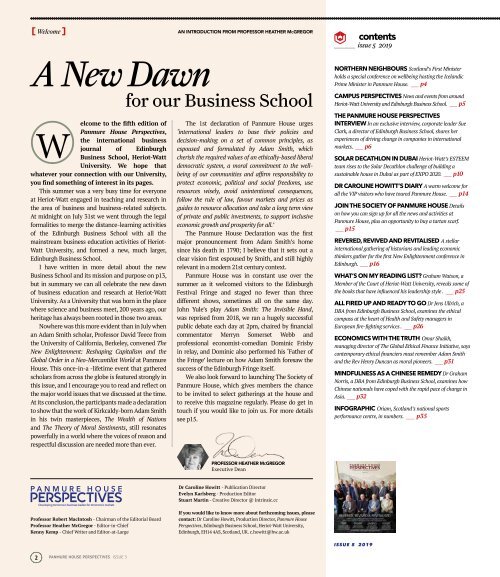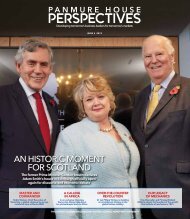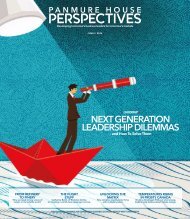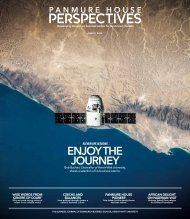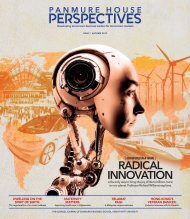Panmure House Perspectives - Issue 5, 2019
Panmure House Perspectives, the new international business journal of Edinburgh Business School, which showcases the best research undertaken by our doctoral students, interviews with major global business figures and viewpoints from leading academics from or own university and beyond.
Panmure House Perspectives, the new international business journal of Edinburgh Business School, which showcases the best research undertaken by our doctoral students, interviews with major global business figures and viewpoints from leading academics from or own university and beyond.
Create successful ePaper yourself
Turn your PDF publications into a flip-book with our unique Google optimized e-Paper software.
OPENING GAMBIT<br />
Welcome<br />
A New Dawn<br />
for our Business School<br />
elcome to the fifth edition of<br />
W<br />
<strong>Panmure</strong> <strong>House</strong> <strong>Perspectives</strong>,<br />
the international business<br />
journal of Edinburgh<br />
Business School, Heriot-Watt<br />
University. We hope that<br />
whatever your connection with our University,<br />
you find something of interest in its pages.<br />
This summer was a very busy time for everyone<br />
at Heriot-Watt engaged in teaching and research in<br />
the area of business and business-related subjects.<br />
At midnight on July 31st we went through the legal<br />
formalities to merge the distance-learning activities<br />
of the Edinburgh Business School with all the<br />
mainstream business education activities of Heriot-<br />
Watt University, and formed a new, much larger,<br />
Edinburgh Business School.<br />
I have written in more detail about the new<br />
Business School and its mission and purpose on p13,<br />
but in summary we can all celebrate the new dawn<br />
of business education and research at Heriot-Watt<br />
University. As a University that was born in the place<br />
where science and business meet, 200 years ago, our<br />
heritage has always been rooted in those two areas.<br />
Nowhere was this more evident than in July when<br />
an Adam Smith scholar, Professor David Teece from<br />
the University of California, Berkeley, convened The<br />
New Enlightenment: Reshaping Capitalism and the<br />
Global Order in a Neo-Mercantilist World at <strong>Panmure</strong><br />
<strong>House</strong>. This once-in-a -lifetime event that gathered<br />
scholars from across the globe is featured strongly in<br />
this issue, and I encourage you to read and reflect on<br />
the major world issues that we discussed at the time.<br />
At its conclusion, the participants made a declaration<br />
to show that the work of Kirkcaldy-born Adam Smith<br />
in his twin masterpieces, The Wealth of Nations<br />
and The Theory of Moral Sentiments, still resonates<br />
powerfully in a world where the voices of reason and<br />
respectful discussion are needed more than ever.<br />
PANMURE HOUSE<br />
PERSPECTIVES<br />
Developing tomorrow’s business leaders for tomorrow’s markets<br />
Professor Robert MacIntosh - Chairman of the Editorial Board<br />
Professor Heather McGregor - Editor-in-Chief<br />
Kenny Kemp - Chief Writer and Editor-at-Large<br />
AN INTRODUCTION FROM PROFESSOR HEATHER McGREGOR<br />
The 1st declaration of <strong>Panmure</strong> <strong>House</strong> urges<br />
‘international leaders to base their policies and<br />
decision-making on a set of common principles, as<br />
espoused and formulated by Adam Smith, which<br />
cherish the required values of an ethically-based liberal<br />
democratic system, a moral commitment to the wellbeing<br />
of our communities and affirm responsibility to<br />
protect economic, political and social freedoms, use<br />
resources wisely, avoid unintentional consequences,<br />
follow the rule of law, favour markets and prices as<br />
guides to resource allocation and take a long term view<br />
of private and public investments, to support inclusive<br />
economic growth and prosperity for all.’<br />
The <strong>Panmure</strong> <strong>House</strong> Declaration was the first<br />
major pronouncement from Adam Smith’s home<br />
since his death in 1790; I believe that it sets out a<br />
clear vision first espoused by Smith, and still highly<br />
relevant in a modern 21st century context.<br />
<strong>Panmure</strong> <strong>House</strong> was in constant use over the<br />
summer as it welcomed visitors to the Edinburgh<br />
Festival Fringe and staged no fewer than three<br />
different shows, sometimes all on the same day.<br />
John Yule’s play Adam Smith: The Invisible Hand,<br />
was reprised from 2018, we ran a hugely successful<br />
public debate each day at 2pm, chaired by financial<br />
commentator Merryn Somerset Webb and<br />
professional economist-comedian Dominic Frisby<br />
in relay, and Dominic also performed his ‘Father of<br />
the Fringe’ lecture on how Adam Smith foresaw the<br />
success of the Edinburgh Fringe itself.<br />
We also look forward to launching The Society of<br />
<strong>Panmure</strong> <strong>House</strong>, which gives members the chance<br />
to be invited to select gatherings at the house and<br />
to receive this magazine regularly. Please do get in<br />
touch if you would like to join us. For more details<br />
see p15.<br />
PROFESSOR HEATHER McGREGOR<br />
Executive Dean<br />
Dr Caroline Howitt - Publication Director<br />
Evelyn Karlsberg - Production Editor<br />
Stuart Martin - Creative Director @ Intrinsic.cc<br />
If you would like to know more about forthcoming issues, please<br />
contact: Dr Caroline Howitt, Production Director, <strong>Panmure</strong> <strong>House</strong><br />
<strong>Perspectives</strong>, Edinburgh Business School, Heriot-Watt University,<br />
Edinburgh, EH14 4AS, Scotland, UK. c.howitt@hw.ac.uk<br />
contents<br />
___________ issue 5 <strong>2019</strong><br />
NORTHERN NEIGHBOURS Scotland’s First Minister<br />
holds a special conference on wellbeing hosting the Icelandic<br />
Prime Minister in <strong>Panmure</strong> <strong>House</strong>. ____ p4<br />
CAMPUS PERSPECTIVES News and events from around<br />
Heriot-Watt University and Edinburgh Business School. ____ p5<br />
THE PANMURE HOUSE PERSPECTIVES<br />
INTERVIEW In an exclusive interview, corporate leader Sue<br />
Clark, a director of Edinburgh Business School, shares her<br />
experiences of driving change in companies in international<br />
markets. ____ p6<br />
SOLAR DECATHLON IN DUBAI Heriot-Watt’s ESTEEM<br />
team rises to the Solar Decathlon challenge of building a<br />
sustainable house in Dubai as part of EXPO 2020. ____ p10<br />
DR CAROLINE HOWITT’S DIARY A warm welcome for<br />
all the VIP visitors who have toured <strong>Panmure</strong> <strong>House</strong>. ____ p14<br />
JOIN THE SOCIETY OF PANMURE HOUSE Details<br />
on how you can sign up for all the news and activities at<br />
<strong>Panmure</strong> <strong>House</strong>, plus an opportunity to buy a tartan scarf.<br />
____ p15<br />
REVERED, REVIVED AND REVITALISED A stellar<br />
international gathering of historians and leading economic<br />
thinkers gather for the first New Enlightenment conference in<br />
Edinburgh. ____ p16<br />
WHAT’S ON MY READING LIST? Graham Watson, a<br />
Member of the Court of Heriot-Watt University, reveals some of<br />
the books that have influenced his leadership style . ____ p25<br />
ALL FIRED UP AND READY TO GO Dr Jens Ullrich, a<br />
DBA from Edinburgh Business School, examines the ethical<br />
compass at the heart of Health and Safety managers in<br />
European fire-fighting services . ____ p26<br />
ECONOMICS WITH THE TRUTH Omar Shaikh,<br />
managing director of The Global Ethical Finance Initiative, says<br />
contemporary ethical financiers must remember Adam Smith<br />
and the Rev Henry Duncan as moral pioneers. ____ p31<br />
MINDFULNESS AS A CHINESE REMEDY Dr Graham<br />
Norris, a DBA from Edinburgh Business School, examines how<br />
Chinese nationals have coped with the rapid pace of change in<br />
Asia. ____ p32<br />
INFOGRAPHIC Oriam, Scotland’s national sports<br />
performance centre, in numbers. ____ p35<br />
PROFESSOR ROBERT MACINTOSH,<br />
Head of School of Social Sciences;<br />
Heriot-Watt University, says<br />
leadership in the low-carbon<br />
economy requires much more open<br />
and wider engagement to ensure a<br />
radical change in behaviour.<br />
he received wisdom is that in times of<br />
T<br />
change, leadership matters more than<br />
management. Even a passing familiarity with<br />
our immersive, rolling news coverage suggests<br />
that we are experiencing a period of significant<br />
political and economic turmoil. Governments<br />
and economies regularly experience turmoil<br />
but now, a new ingredient is being added to the<br />
mix in the form of the new narrative relating<br />
to sustainability. Leaders have always had to<br />
find new ways to compete but how do we find<br />
new ways to compete sustainably?<br />
Several years ago, a colleague and I wrote a<br />
paper which defined the relationship between<br />
management and leadership as the relationship<br />
between the organisation of production and the<br />
production of organisation. It’s more than just<br />
GOOD<br />
ideas<br />
COME FROM THE<br />
strangest places<br />
a play on words. Management matters because<br />
whether you are producing a physical product, new<br />
knowledge such as world-leading research or even<br />
something as ephemeral as a customer experience,<br />
the doing of things has to be organised. Leadership<br />
matters more because it involves shaping the<br />
processes of organising and managing. Leadership<br />
gets really challenging when we face problems<br />
we’ve never come across before. Producing an<br />
organised response in these circumstances is a<br />
challenge. In most businesses we know how to<br />
organise production, even if we could do so a little<br />
more efficiently. But how to produce in ways which<br />
are sustainable represents a new and evolving type<br />
of problem.<br />
Colleagues at Heriot-Watt, as in many other<br />
organisations, are beginning to think through<br />
a response to the climate crisis. As a university,<br />
some of our technological research might<br />
help produce dramatically more efficient and<br />
sustainable ways of producing energy, reducing<br />
consumption and improving sustainability.<br />
Some of our social science research might help<br />
encourage consumers to change their behaviours<br />
in ways which enable more sustainable modes<br />
of operating. Yet alongside these academic<br />
challenges, we cannot escape the need to think<br />
about the conduct of our day-to-day business.<br />
There’s an urgent need to engage our<br />
community of staff, students and alumni in<br />
the process of rethinking the organisation of<br />
our production. Everything from the learner<br />
experience, to buildings in which we work and how<br />
we feed our staff and students is up for debate.<br />
If we, as a university, are to establish a carbon<br />
neutral mode of operating we’ll need to rethink<br />
every aspect of how we work. Getting staff and<br />
students into large lecture theatres is historically<br />
a core part of university life. Educational concerns<br />
about the effectiveness of the traditional lecture<br />
aside, there are ecological concerns about the<br />
carbon consequences of getting everyone to and<br />
from one of our campuses. A simplistic response<br />
might be to imagine that new students, digital<br />
natives since kindergarten, might even prefer to<br />
be educated remotely. Yet, digital solutions bring<br />
their own carbon challenges with some estimates<br />
that the worldwide web is on a par with the aviation<br />
industry as a source of emissions. A completely<br />
new way of thinking would be entailed in getting<br />
academic staff to design a learning experience<br />
that was educationally effective yet ecologically<br />
sustainable.<br />
How then, do business leaders in every sector<br />
of the economy create the circumstances in which<br />
carbon neutral solutions can emerge?<br />
There are three things that help with delivering<br />
radical change, rapidly. The first is to engage<br />
openly and widely with the whole organisation,<br />
your customers, suppliers, regulators and anyone<br />
else you can think of. Good ideas come from<br />
the strangest of places and engaged staff are<br />
more inclined to help you follow through with<br />
new ways of working if they’ve had a hand in<br />
shaping the solution. The second is to simplify<br />
your messaging. A few simple rules that convey<br />
“you can do anything you want so long as it does<br />
X or doesn’t do Y” are much more amenable to<br />
creative, localised solutions than a lengthy set<br />
of corporate edicts. Third, make it obvious that<br />
you’re serious about change. Sharing examples<br />
of good practice, highlighting what works and<br />
why is likely to encourage other parts of the<br />
organisation to do likewise. Amplifying successes<br />
is more likely to be effective than trying to micromanage<br />
change at scale.<br />
The future of the planet rests on the quality of<br />
the leadership that we each show in reshaping our<br />
organisation, its operating assumptions and the<br />
ecological consequences of those assumptions.<br />
That’s the real leadership challenge of our times.<br />
ISSUE 5 <strong>2019</strong><br />
2 PANMURE HOUSE PERSPECTIVES ISSUE 5<br />
ISSUE 5 PANMURE HOUSE PERSPECTIVES<br />
3


